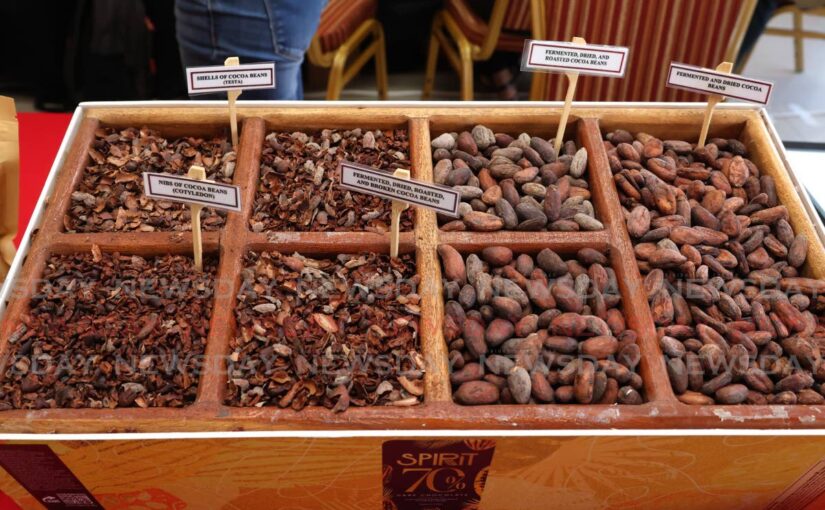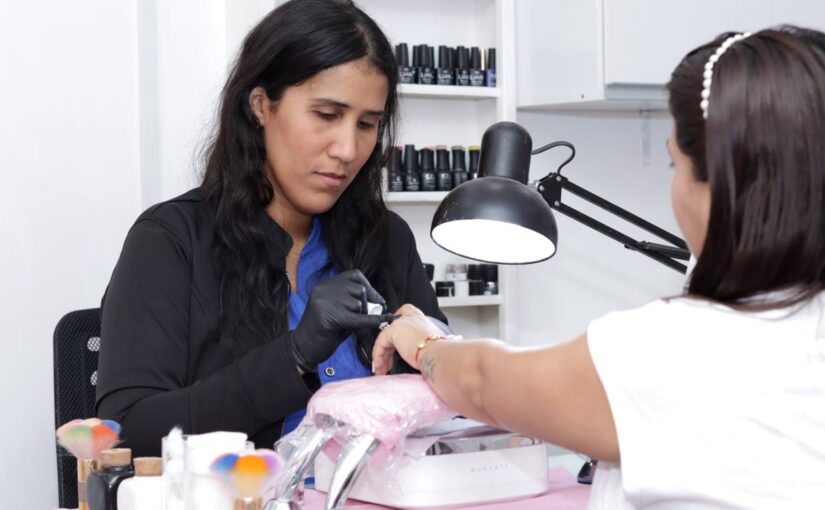Latino entrepreneurship is on the rise, with several businesses exploring the economic opportunities TT has to offer. With each passing day, more...
Vous n'êtes pas connecté
- English
- Français
- عربي
- Español
- Deutsch
- Português
- русский язык
- Català
- Italiano
- Nederlands, Vlaams
- Norsk
- فارسی
- বাংলা
- اردو
- Azərbaycan dili
- Bahasa Indonesia
- Հայերեն
- Ελληνικά
- Bosanski jezik
- українська мова
- Íslenska
- Türkmen, Түркмен
- Türkçe
- Shqip
- Eesti keel
- magyar
- Қазақ тілі
- Kalaallisut ; kalaallit oqaasii
- Lietuvių kalba
- Latviešu valoda
- македонски јазик
- Монгол
- Bahasa Melayu ; بهاس ملايو
- ဗမာစာ
- Slovenščina
- тоҷикӣ ; toğikī ; تاجیکی
- ไทย
- O'zbek ; Ўзбек ; أۇزبېك
- Tiếng Việt
- ភាសាខ្មែរ
- རྫོང་ཁ
- Soomaaliga ; af Soomaali
Rubriques :
 Maroc - NEWSDAY.CO.TT - A la Une - 26/12/2024 04:52
Maroc - NEWSDAY.CO.TT - A la Une - 26/12/2024 04:52
Trini cocoa still the best
The prestige of TT’s award-winning cocoa cannot be denied, but with a decline in production over the years caused by various issues such as labour shortages, the industry's future remains uncertain for those whose lives and livelihoods depend on it. Business Day spoke to three business owners who were featured at the cocoa expo held by the Cocoa Research Centre (CRC) on November 29. They spoke about their hopes and challenges and gave keen insight into the industry from their different perspectives. Noreen Nunez is a European-trained luxury-chocolate maker and owner of Voulez Chocolat. Having worked as a chocolate-maker in both the US and UK, she has brought her expertise back to her homeland, where she produces a range of luxury chocolate products made from 100 per cent local cocoa. Kerry Ann Deo is a self-starting entrepreneur and owner of Chawklit, a brand that grew from a cupcake business she started after high school. Having studied human nutrition and dietetics as well as food science and technology, Deo now produces chocolate bars and drinking chocolate in a variety of flavour combinations. Jabari Lynch is the owner of Lynch’s Nuts and Stuff, a family business passed onto him by his parents, who taught him the various aspects of the industry from agro-processing to baking. Now ten years into the business, he makes products that feature a mixture of locally sourced nuts fruits and chocolate in various blends of sweet and savoury flavours. Material sourcing Each of these business owners sources their raw materials from local farmers, suppliers and through the CRC. While careful preparation for the busy holiday season has ensured an adequate stock of most raw materials, issues in the supply chain have still had their effect. Deo says this year has been the first time she has experienced notable disruptions in sourcing cocoa butter. Her main supplier is experiencing a significant cocoa shortage owing to deforestation near his farm in the east-coast village of Plum Mitan. “The lumber industry is pretty vibrant, and so he told me that because a lot of the trees are being cut down, a lot of animals are losing their habitats including monkeys. Now, because they have nowhere to go and no food, they come to the cocoa fields to eat the cocoa.” The effects of deforestation, in addition to the typical issue of diseases affecting the crop, have caused such a drastic drop in the farmer's supply of coca that he cannot meet the demand for cocoa butter. This leaves Deo scrambling to find an alternative supplier to fulfil the increasing number of orders that come closer to the Christmas season, and even considering processing her own cocoa butter. But with the volume of cocoa, the amount of space and the cost of the equipment needed for cocoa-butter processing, the option is hardly feasible. While Nunez has sourced a sufficient amount of cocoa butter to last her well into the next year, she says issues in sourcing it are not uncommon. [caption id="attachment_1128807" align="alignnone" width="648"] Voulez Chocolat owner Noreen Nunez and her line of luxury chocolates. -[/caption] “Cocoa butter is usually a challenge, because only some people make it.” But she says as a luxury chocolate maker, the sourcing of raw materials is not her only concern. Thanks to the delicate nature of her luxury products, special considerations need to be made, even down to the packaging. "Trinidad doesn't really have the proper packaging for certain chocolates, like bonbons. So we have to import it because you need to have chocolate packaged and stored in a particular way." Local market competition With the country spending billions on imported food, smaller businesses are forced to compete with imported brands that tend to be cheaper and more accessible. But that does not deter these business owners from competing in the local market, as they use various strategies. Lynch offers additional elements, such as customising his products to fit customers' tastes and providing delivery services to differentiate his brand. [caption id="attachment_1128853" align="alignnone" width="1024"] Jabari Lynch, owner of Lynch’s Nuts and Stuff. - Photo by Faith Ayoung[/caption] “Even though the competition is there, I enjoy it. Because you have to look at the picture from a wider perspective and understand that it’s like an iceberg. What you see in the supermarket is just the tip – it’s a large tip, but it’s just the tip. “There’s always a hidden market somewhere where you’re able to find your niche and your particular taste.” Deo, whose business saw a boost during the pandemic because of social media marketing, says her branding is about more than just the product. [caption id="attachment_1128809" align="aligncenter" width="485"] Kerry Ann Deo, owner of Chawklit, stands infront of a display of her chocolate treats. -[/caption] “People really buy the story, not so much the product. They gravitate more towards your personality, the story of the business and the brand. That is what makes it unique to you.” She said paying attention to online trends and seasonal tastes, along with ensuring a sustained quality of product, go a long way in boosting sales and customer retention. “People purchase with their eyes, but they only repurchase with their tongue. So you have to keep up that level of quality so people will associate your brand with quality” With the recent opening of the Barbados-based Green Monkey Chocolatier store in West Mall, the luxury chocolate market in TT has expanded, and despite the competition it might pose, Nunez says she welcomes it, as it enhances the visibility of the luxury chocolate industry and enhances customer appreciation for true luxury items. “Luxury for people here has been Lindt or Hersheys, and now people are going to understand that that’s not luxury, this is luxury. I think the competition is nice, I think it’s friendly...I'm glad they came, I’m glad they opened up the eyes of the market in TT.” Expansion challenges But Nunez said her ability to export is hampered by physical limitations. Temperature constraints, limited storage life and shelf life and a lack of local courier services that can transport her products abroad mean getting the chocolate out of the country to be sold elsewhere is a major challenge. “There are no reefers – reefers meaning refrigerated containers to get them out of the country – so that is a major challenge in terms of visibility abroad. We may have the best chocolate, but how do you get it out there?” Deo also expressed concern about the export potential of cocoa itself. It's a labour-intensive, fragile, seasonal crop that can be highly susceptible to diseases, so mass production, which is essential for international marketing, seems out of reach. “We have a good level of cocoa, but I don’t think we have enough to compete with the international brand.” Hope for the local market Despite the challenges, however, all is not lost. With a strong network of business owners, farmers and organisations there are still opportunities for growth and expansion in the industry. The CRC, with its initiatives such as the International Fine Cocoa Innovation Centre (IFCIC), provides support to stakeholders. “They help the farmers with the technicalities of producing and even getting the beans roasted at the right temperature – there’s a lot of training for that,“ Nunez said. Deo also testified to the work the CRC does. “A big part of what they do is outreach…that’s part of the culture of the people at CRC, where, if you need something, they will help you.” She said other organisations like the Caribbean Industrial Research Institute (CARIRI) and ExporTT are also helpful, and overall there is a collaborative culture among stakeholders in the industry. “I think everyone in the industry is playing a small part, but we’re doing it together, and that could only mean good things when it comes to growth. Because the more sales I get, the more raw material I need, which means the more I will purchase, and in doing so, the money goes back to the farmer. "If anyone on the supply chain is getting support in some way – whether it be grants or support from the public, people purchasing their product – it will all lead back to the beans, it will all lead back to farmers. “I am doing my part, and I know a lot of other people are doing their part just by showing up to the market, purchasing from stores, advertising on social media. It increases awareness ,which helps with the culture aspect of it and it boosts sales.” Lynch is taking full advantage of the Youth and National Service Ministry’s Youth Agricultural Homestead Programme (YAHP) programme, which provides access to land, a starter home and technical and financial support after completing two years of training. “In my opinion, what tops all of that and concretises everything is that there’s a network of support from business people, public servants and departments of ministries that are focused on moving TT forward in agriculture.” The post Trini cocoa still the best appeared first on Trinidad and Tobago Newsday.
Articles similaires
Latino entrepreneurs make their way in Trinidad and Tobago
Latino entrepreneurship is on the rise, with several businesses exploring the economic opportunities TT has to offer. With each passing day, more...
Iennesha Bailey wants to be seen for her own merit
MUSICIAN Iennesha Bailey, 15, says she has been writing songs, lyrics and melodies, since the age of seven and they have been piling up. Bailey said...
Love of music takes Sherisse Collymore stage front
SHERISSE Collymore has been in love with music since she was a child. She would gape in sheer glee at musicals like The Sound of Music and The Wizard...
Palmyra kicks off 2025 at Writers Centre
THE Writers Centre hosts its first event for 2025 on January 16 at 5.30 pm, with a reading and discussion of Palmyra, the Caribbean Gothic suspense...
Andra Wilson: The cervical cancer chronicles
ANDRA “ANDREA” WILSON was 25 and pregnant when she learned she had cervical cancer. She was shocked and scared for her life and that of her...
Paintings in the Garden 6 pays tribute to Calypso Rose
The weather outside was frightful, but the atmosphere inside the Trinidad and Tobago’s Consulate General, New York was culturally cosy – tropical...
Clerk tells of WhatsApp messages between her and judge
THE judge’s clerk who laid a complaint of sexual harassment against Eastern Cape Judge President Selby Mbenenge told the Judicial Conduct Tribunal...
Suggestion for diversification
THE EDITOR: Over the Christmas season the discussion of foreign exchange popped up again. With many pointing fingers and complaining about how we...
Trinidad and Tobago artist wants to create international platforms for local artists
Patrice Matthews may still be considered a baby in the TT art world, but her work was recently shown on an international platform – in Manhattan,...
Les derniers communiqués
-
Aucun élément









